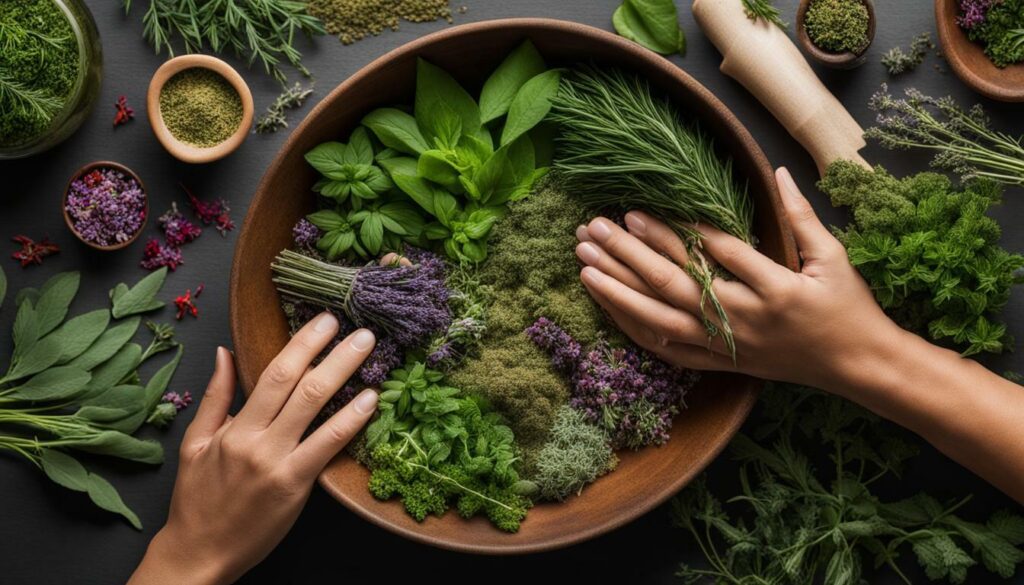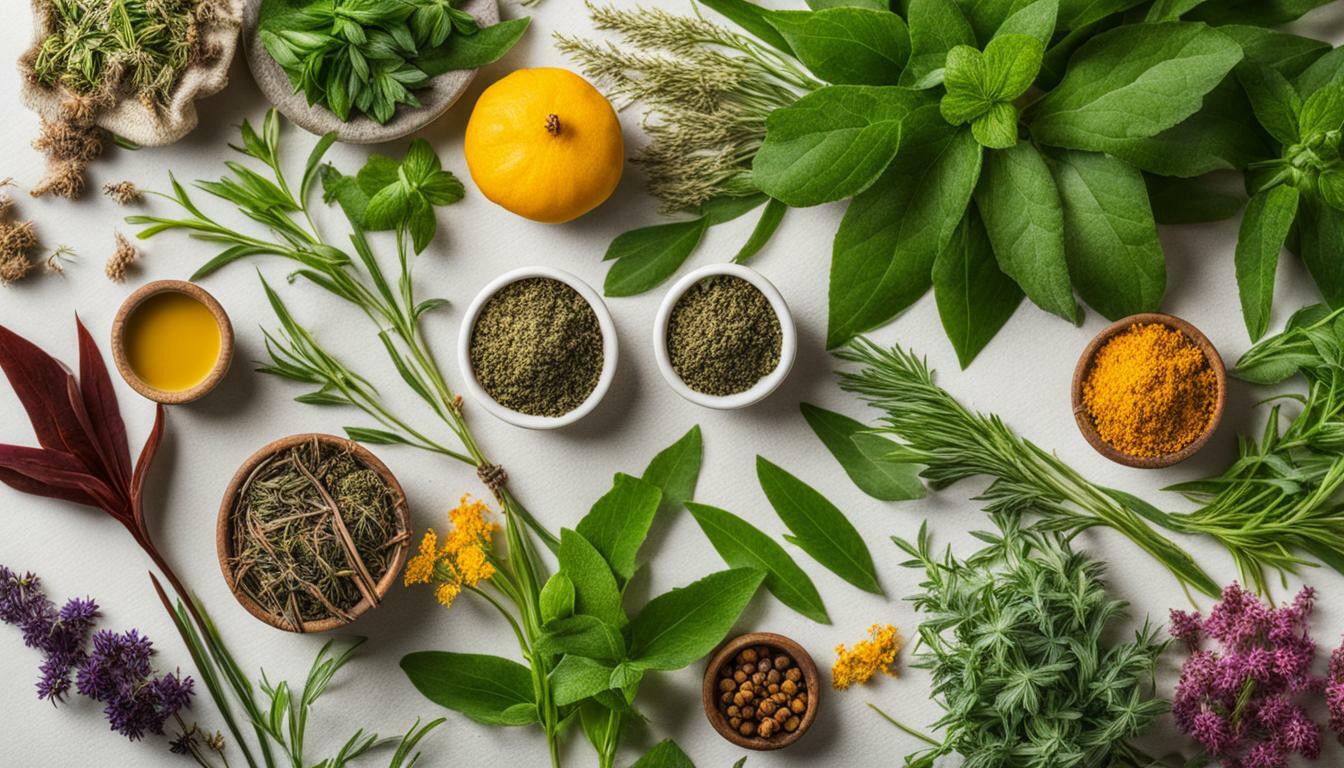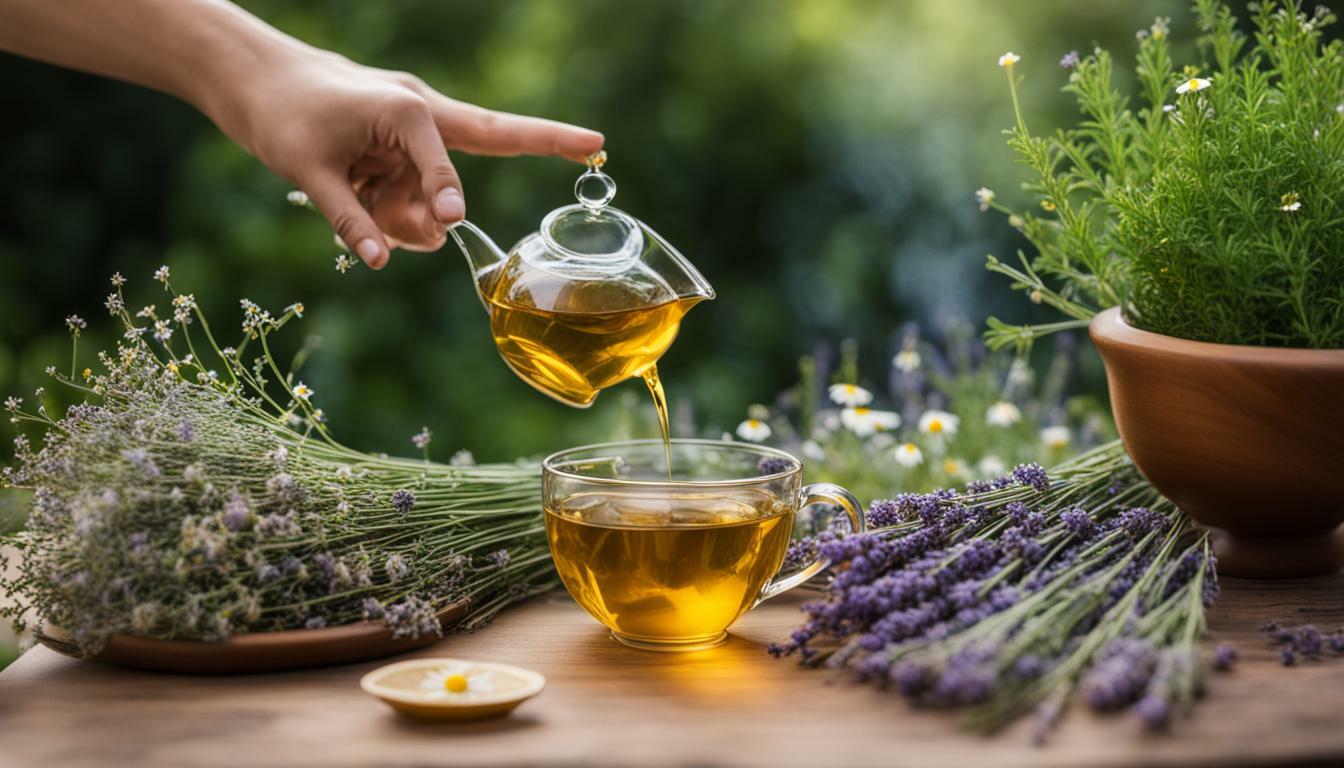Are you looking for a natural approach to arthritis relief? Explore the power of herbal medicine for arthritis treatment. Herbal medicine has been used for thousands of years to treat various ailments, including arthritis. Several herbal remedies have shown effectiveness in relieving arthritis pain, such as turmeric, ginger, Boswellia serrata, devil’s claw, willow bark extract, and feverfew. These herbs can be taken in different forms, including pills, capsules, teas, creams, gels, extracts, and tinctures. Each form offers its own benefits and absorption rates, allowing individuals to find the most suitable option.
- Herbal medicine has a long history of use in treating various ailments, including arthritis.
- Turmeric, ginger, Boswellia serrata, devil’s claw, willow bark extract, and feverfew are commonly used herbal remedies for arthritis.
- These herbal remedies can be taken in different forms, such as pills, capsules, teas, creams, gels, extracts, and tinctures.
- Consulting with a healthcare professional is important before using herbal remedies, as they may interact with other medications and have potential side effects.
- Complementary approaches, like weight management and acupuncture, can enhance the effectiveness of herbal medicine for arthritis treatment.
Understanding Arthritis and Its Impact on Daily Life
Arthritis can significantly affect your quality of life, making simple tasks like opening a jar or walking up the stairs a challenge. Discover how herbal medicine can help you manage arthritis and regain control of your daily life.
Arthritis is a chronic condition characterized by inflammation in one or more joints, resulting in pain, stiffness, and reduced mobility. It can be caused by various factors, including age, genetics, and lifestyle. The most common types of arthritis are osteoarthritis, rheumatoid arthritis, and psoriatic arthritis.
Living with arthritis can be challenging, as it can impact your ability to perform daily activities and adversely affect your overall well-being. The pain and stiffness associated with arthritis can make it difficult to engage in physical activities, leading to decreased muscle strength and flexibility. This can further contribute to feelings of frustration, isolation, and even depression.
Fortunately, herbal medicine offers a natural and effective approach to managing arthritis symptoms. Herbal remedies, such as turmeric, ginger, Boswellia serrata, devil’s claw, willow bark extract, and feverfew, have been used for centuries to alleviate inflammation, reduce pain, and improve joint function. These herbs can be taken in various forms, including pills, capsules, teas, creams, gels, extracts, and tinctures, making them convenient options for individuals seeking alternative treatments.

It is important to note that while herbal remedies can provide relief, it is crucial to consult with a healthcare professional before incorporating them into your arthritis management plan. This is especially important if you are currently taking other medications, as herbal remedies can interact with them and cause adverse effects. Additionally, individual responses to herbal medicine can vary, so it is essential to find the right dosage and form that works best for you.
In addition to herbal medicine, complementary approaches can also play a role in managing arthritis symptoms. Weight management, through a combination of regular exercise and a healthy diet, can help reduce the strain on joints and alleviate pain. Acupuncture, a traditional Chinese medicine technique, has also shown promising results in relieving arthritis pain and improving joint function.
While herbal medicine and complementary approaches can be valuable tools in managing arthritis, it is important to remember that they should not replace conventional medical treatments. It is always advisable to consult with a healthcare professional who can provide comprehensive guidance and ensure that your treatment plan is safe and effective for your specific needs.
| Herbal Remedy | Benefits | Form |
|---|---|---|
| Turmeric | Powerful anti-inflammatory properties | Capsules, extracts |
| Ginger | Reduces inflammation and pain | Tea, extracts |
| Boswellia Serrata | Relieves joint swelling and pain | Capsules, creams |
| Devil’s Claw | Alleviates joint pain and stiffness | Tinctures, tablets |
| Willow Bark Extract | Reduces pain and inflammation | Tablets, capsules |
| Feverfew | Relieves migraines and arthritis pain | Teas, capsules |
Commonly Used Herbal Remedies for Arthritis
When it comes to herbal medicine for arthritis, there are several powerful herbs that have been used for centuries to provide relief. Let’s explore some of the most commonly used herbal remedies and how they can benefit those with arthritis.
Turmeric: Turmeric is a vibrant yellow spice that contains a compound called curcumin, known for its anti-inflammatory properties. Studies have shown that curcumin can help reduce joint inflammation and pain associated with arthritis. It can be taken in capsule form or added to food to reap its benefits.
Ginger: Ginger has long been used in traditional medicine to treat various ailments, including arthritis. It contains gingerols, which have anti-inflammatory and analgesic effects. Ginger can be consumed as a tea, added to dishes, or taken in supplement form to help alleviate arthritis symptoms.
Boswellia serrata: Also known as Indian frankincense, Boswellia serrata is a resin extracted from the Boswellia tree. It contains compounds called boswellic acids, which have been shown to reduce inflammation and inhibit certain enzymes that contribute to arthritis. Boswellia serrata is available in capsule or extract form.
| Herb | Form | Benefits |
|---|---|---|
| Turmeric | Capsule or food additive | Reduces joint inflammation and pain |
| Ginger | Tea, food additive, or supplement | Has anti-inflammatory and analgesic effects |
| Boswellia serrata | Capsule or extract | Reduces inflammation and inhibits arthritis-related enzymes |

Other herbal remedies that have shown promise in arthritis management include devil’s claw, willow bark extract, and feverfew. Devil’s claw has been used traditionally to reduce joint pain and inflammation. Willow bark extract contains salicin, a compound similar to aspirin, which can help alleviate arthritis pain. Feverfew, on the other hand, has been used to reduce migraine headaches and may also have anti-inflammatory properties.
It’s important to note that while herbal remedies can provide relief for arthritis symptoms, consulting with a healthcare professional is essential. They can help evaluate your specific condition, provide guidance on appropriate dosages, and ensure that the herbs do not interfere with any other medications you may be taking.
Remember, herbal remedies should not be used as sole treatments for arthritis, and their long-term safety is not established as they are not regulated by the Food and Drug Administration (FDA). However, when used in conjunction with proper medical advice and other complementary approaches like weight management and acupuncture, herbal remedies can play a valuable role in arthritis management.
Different Forms of Herbal Medicine for Arthritis
Herbal medicine comes in different forms, allowing you to choose the one that suits your preferences and needs. Let’s explore the different forms of herbal remedies available for arthritis relief.
Pills and capsules: Herbal supplements for arthritis pain relief are commonly available in pill or capsule form. These are convenient and easy to take, providing a standardized dosage of the herbal extract. However, it’s important to follow the recommended dosage and consult with a healthcare professional to ensure they don’t interact with any other medications you may be taking.
Teas: Herbal teas are another popular way to consume herbal remedies for arthritis. They can be made by steeping the herbs in hot water and enjoyed daily. Not only do they provide the benefits of the herbs, but they also offer a soothing and comforting experience. It’s important to note that the concentration of active ingredients in herbal teas may vary, so it’s best to consult with an herbalist or healthcare professional for guidance on the appropriate dosage.
Creams, gels, extracts, and tinctures: Herbal remedies can also be applied topically in the form of creams, gels, extracts, or tinctures. These external applications can provide localized relief, targeting specific areas of joint pain or inflammation. They are easily absorbed through the skin and can be used alongside other forms of herbal medicine. Again, it’s crucial to follow the instructions provided and consult with a healthcare professional if you have any concerns.
Table: Comparison of Different Forms of Herbal Medicine for Arthritis
| Form | Benefits | Absorption Rate |
|---|---|---|
| Pills/Capsules | Convenient, standardized dosage | Varies depending on the herb and individual |
| Teas | Soothing, comforting experience | Varies depending on the concentration |
| Creams/Gels | Localized relief | Easily absorbed through the skin |
| Extracts/Tinctures | Targeted application | Quick absorption |
It’s important to note that while herbal remedies can provide relief for arthritis symptoms, they should not be used as sole treatments. It’s always advisable to consult with a healthcare professional, especially if you are taking other medications or have underlying medical conditions. They can help guide you on the appropriate dosage, potential interactions, and possible side effects.
In addition to herbal medicine, there are other complementary approaches that can be used in conjunction with herbal remedies for arthritis treatment. These include weight management to reduce stress on the joints and acupuncture to target specific areas of pain. It’s important to explore a holistic approach and work with healthcare professionals to develop a comprehensive treatment plan.
Remember, while herbal remedies have been used for centuries and have shown promise in relieving arthritis symptoms, their long-term safety is not established due to the lack of regulation by the Food and Drug Administration (FDA). Use them responsibly and under the guidance of a healthcare professional to ensure the best possible outcome for your arthritis management.

While herbal remedies can offer effective relief for arthritis, it’s crucial to consult with a healthcare professional before adding them to your treatment plan. Let’s discuss why professional guidance is essential when using herbal medicine.
When it comes to managing arthritis symptoms, herbal remedies can provide a natural and holistic approach. However, it’s important to remember that these remedies are not regulated by the Food and Drug Administration (FDA) like conventional medications. This lack of regulation means that the safety, efficacy, and quality of herbal products can vary widely. Consulting with a healthcare professional who is knowledgeable about herbal medicine can help ensure that you are using the right remedies and in the correct dosage.
Another important reason to seek professional guidance is to avoid potential interactions with other medications. Herbal remedies can have pharmacological effects and may interact with prescription medications, over-the-counter drugs, or even other herbal supplements. A healthcare professional can assess your current medication regimen and provide guidance on using herbal remedies safely and effectively.
“It’s crucial to consult with a healthcare professional before using herbal remedies for arthritis.”
Furthermore, a healthcare professional can help monitor your progress and make adjustments to your treatment plan as needed. They can provide valuable insights based on their experience and knowledge, ensuring that you are getting the most benefit from your herbal remedies. Additionally, they can help address any concerns or questions you may have, providing peace of mind throughout your treatment journey.
Remember, while herbal remedies can be a valuable addition to your arthritis treatment plan, it is important to consult with a healthcare professional who can offer personalized guidance. Their expertise and oversight will help ensure that you are using herbal remedies safely and effectively, while minimizing the risk of potential side effects or interactions with other medications.

| Pros of Consulting with a Healthcare Professional |
|---|
| Expert guidance on choosing the right herbal remedies |
| Assessment of potential interactions with other medications |
| Personalized treatment plan and monitoring of progress |
| Addressing concerns and providing peace of mind |
Complementary Approaches to Arthritis Treatment
In addition to herbal medicine, there are other complementary approaches that can enhance your arthritis treatment. Let’s discover the benefits of weight management and acupuncture in managing arthritis symptoms.
Weight Management: Maintaining a healthy weight is crucial in managing arthritis, as excess weight puts extra stress on the joints. Research shows that even a modest weight loss can significantly reduce arthritis pain and improve joint function. By following a balanced diet and engaging in regular physical activity, you can achieve and maintain a healthy weight, thus alleviating the burden on your joints.
Acupuncture: Acupuncture is an ancient technique that involves the insertion of thin needles into specific points on the body. It has been found to effectively relieve arthritis pain by stimulating the release of natural painkillers and reducing inflammation. Acupuncture sessions are typically performed by trained professionals and can be a safe and drug-free alternative for managing arthritis symptoms.
“Acupuncture has provided me with incredible relief from my arthritis pain. The sessions are relaxing and have made a noticeable difference in my daily life.” – Sarah, arthritis patient
Incorporating these complementary approaches into your arthritis treatment plan can provide added support and enhance the effectiveness of herbal remedies. However, it’s crucial to consult with a healthcare professional before starting any new treatment regimen, especially if you have any underlying medical conditions or are taking medication. They can provide personalized guidance and ensure that the chosen approaches are suitable for your specific needs.

To summarize, weight management and acupuncture are two complementary approaches that can play a significant role in managing arthritis symptoms. They can help reduce pain, improve joint function, and enhance overall well-being. Remember that while herbal remedies and complementary approaches can provide relief, they should not be used as sole treatments. It’s important to approach arthritis treatment with a comprehensive and holistic mindset, combining different strategies to achieve the best possible outcomes.
Understanding the Limitations of Herbal Remedies
While herbal medicine can be beneficial for arthritis relief, it’s essential to understand its limitations. Let’s delve into the importance of using herbal remedies as part of a comprehensive treatment plan for arthritis.
Factual data: Herbal medicine has been used for thousands of years to treat various ailments, including arthritis. There are several herbal remedies that are commonly used for arthritis treatment, such as turmeric, ginger, Boswellia serrata, devil’s claw, willow bark extract, and feverfew. These herbs can be taken in various forms, including pills, capsules, teas, creams, gels, extracts, and tinctures. Each form has its own benefits and absorption rates.
However, it’s important to note that herbal remedies should not be used as sole treatments for arthritis. While they can provide relief, they should be used in conjunction with other treatment methods, such as physical therapy, medication, and lifestyle modifications. Arthritis is a complex condition that requires a comprehensive approach to manage its symptoms.
Another important consideration when using herbal remedies is the need to consult with a healthcare professional. These remedies can interact with other medications, potentially causing adverse effects. It’s crucial to inform your healthcare provider about all the supplements and medications you are taking to reduce the risk of interactions. Additionally, herbal remedies may have their own side effects, and a professional can provide guidance on proper dosing and potential risks.
It’s also important to acknowledge that herbal remedies are not regulated by the Food and Drug Administration (FDA). This means that their long-term safety and efficacy are not established. While many people find relief with herbal medicine, it’s essential to approach them with caution and use them as part of a comprehensive arthritis treatment plan under the guidance of a healthcare professional.
FAQ
Can herbal medicine completely cure arthritis?
Herbal medicine can provide relief from arthritis symptoms and reduce inflammation, but it cannot completely cure arthritis. It is important to use herbal remedies in conjunction with other treatment options and consult with a healthcare professional for a comprehensive approach.
Are herbal remedies regulated by the FDA?
No, herbal remedies are not regulated by the FDA. This means that their safety and efficacy are not guaranteed. It is crucial to be cautious when using herbal remedies and consult with a healthcare professional to ensure they are safe for you and do not interact with any medications you may be taking.
Can herbal remedies for arthritis have side effects?
Yes, herbal remedies can have potential side effects, just like any other medication. It is important to be aware of any potential side effects and consult with a healthcare professional before using herbal remedies for arthritis to ensure they are safe for you to use.
Can herbal remedies interact with other medications?
Yes, herbal remedies can interact with other medications. It is important to inform your healthcare professional about any herbal remedies you are using or planning to use to ensure they do not interact with any other medications you may be taking.
Can herbal remedies be used as the sole treatment for arthritis?
No, herbal remedies should not be used as the sole treatment for arthritis. They can provide relief from symptoms, but it is important to use them in conjunction with other treatment options, such as medication, physical therapy, and lifestyle changes, for a comprehensive approach to managing arthritis.
Are all herbal remedies equally effective for arthritis?
Not all herbal remedies are equally effective for arthritis. Different herbs may have different effects on different individuals. It is important to consult with a healthcare professional to determine the most suitable herbal remedies for your specific condition.
Can herbal remedies help with arthritis-related joint inflammation?
Yes, many herbal remedies have been found to help reduce joint inflammation associated with arthritis. Herbs such as turmeric, ginger, Boswellia serrata, devil’s claw, willow bark extract, and feverfew are known for their anti-inflammatory properties and can provide relief from arthritis-related joint inflammation.
Source Links
- https://rheumatology.org/herbal-remedies-supplements-acupuncture-for-arthritis
- https://www.arthritis.org/health-wellness/treatment/complementary-therapies/supplements-and-vitamins/5-ways-to-take-herbs-and-supplements-for-arthritis
- https://www.healthline.com/health/osteoarthritis/herbs-arthritis-pain




